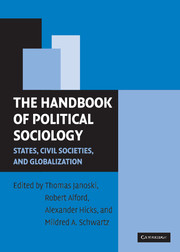Book contents
- Frontmatter
- Contents
- Preface
- Contributors
- Political Sociology in the New Millenium
- PART I THEORIES OF POLITICAL SOCIOLOGY
- PART II CIVIL SOCIETY: THE ROOTS AND PROCESSES OF POLITICAL ACTION
- 10 Money, Participation, and Votes
- 11 Public Opinion, Political Attitudes, and Ideology
- 12 Nationalism in Comparative Perspective
- 13 Political Parties
- 14 Organized Interest Groups and Policy Networks
- 15 Corporate Control, Interfirm Relations, and Corporate Power
- 16 Social Movements and Social Change
- 17 Toward a Political Sociology of the News Media
- PART III THE STATE AND ITS MANIFESTATIONS
- PART IV STATE POLICY AND INNOVATIONS
- PART V GLOBALIZATION AND POLITICAL SOCIOLOGY
- References
- Name Index
- Subject Index
10 - Money, Participation, and Votes
Social Cleavages and Electoral Politics
Published online by Cambridge University Press: 05 June 2012
- Frontmatter
- Contents
- Preface
- Contributors
- Political Sociology in the New Millenium
- PART I THEORIES OF POLITICAL SOCIOLOGY
- PART II CIVIL SOCIETY: THE ROOTS AND PROCESSES OF POLITICAL ACTION
- 10 Money, Participation, and Votes
- 11 Public Opinion, Political Attitudes, and Ideology
- 12 Nationalism in Comparative Perspective
- 13 Political Parties
- 14 Organized Interest Groups and Policy Networks
- 15 Corporate Control, Interfirm Relations, and Corporate Power
- 16 Social Movements and Social Change
- 17 Toward a Political Sociology of the News Media
- PART III THE STATE AND ITS MANIFESTATIONS
- PART IV STATE POLICY AND INNOVATIONS
- PART V GLOBALIZATION AND POLITICAL SOCIOLOGY
- References
- Name Index
- Subject Index
Summary
Democratic governance in the modern world presumes regular elections in which the rights of citizenship include, in principle, equal participation and collective influence over the composition of government. For individuals, “casting a ballot is, by far, the most common act of citizenship in any democracy” (Verba, Scholzman, and Brady, 1995:23). The right to vote also provides the foundation for other political and social rights of individuals and groups. At the aggregate level, election outcomes are an important causal factor behind national policy making (Castles, 1982; Blais, Blake, and Dion, 1996; Powell, 2000; Erikson, MacKuen, and Stimson, 2002:Chap. 7). For example, the institutional characteristics of welfare state regimes have been shown to be influenced by the share of the vote won by left-wing or other party families (e.g., Esping-Andersen, 1990; Hicks, 1999; Huber and Stephens, 2001).
Not surprisingly, given their importance in democratic capitalist societies, elections are also influenced by inequalities in the amount of power and status possessed by different groups. The impact of such inequalities on democratic governance has accordingly been a central topic of investigation in political sociology. Political divisions along class, religious, racial and ethnic, linguistic, national, or gender lines have often led to enduring patterns of conflict in party systems or political institutions. Indeed, the investigation of these divisions helped to define some of the central contributions of the post-World War II generation of political sociology (e.g., Berelson, Lazarsfeld, and McPhee, 1954; Lipset, 1960; Alford, 1963; Lipset and Rokkan, 1967a).
- Type
- Chapter
- Information
- The Handbook of Political SociologyStates, Civil Societies, and Globalization, pp. 201 - 226Publisher: Cambridge University PressPrint publication year: 2003
- 1
- Cited by

